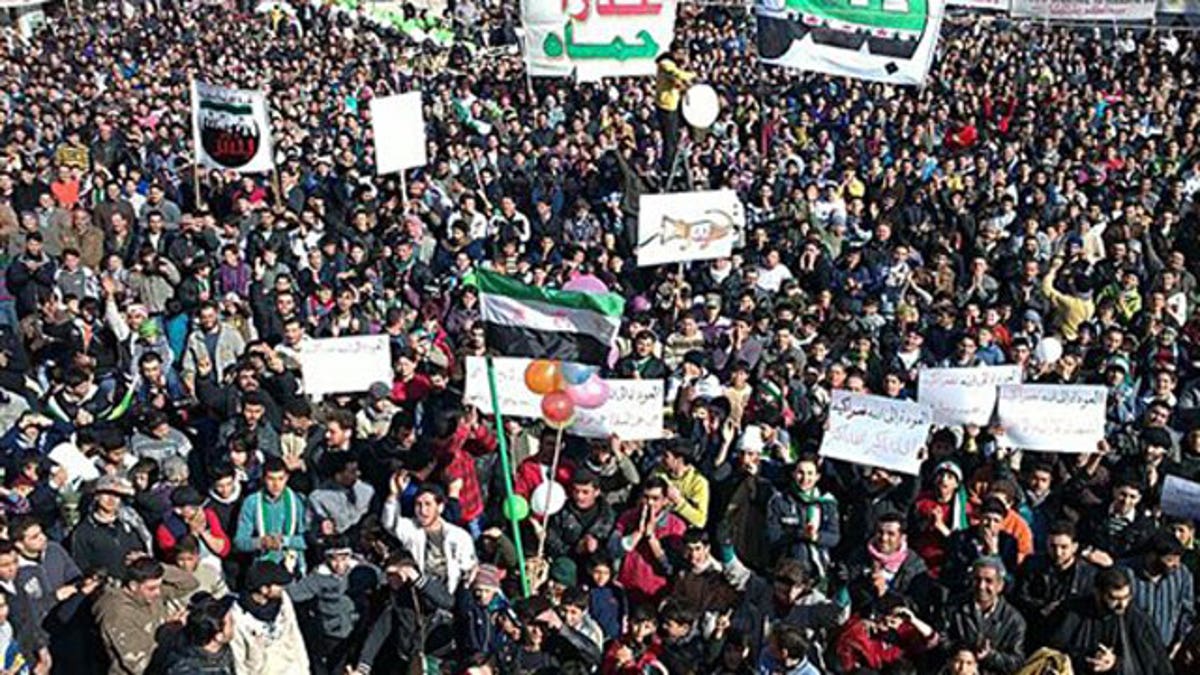
In this citizen journalism image provided by the Local Coordination Committees in Syria and released Friday, Feb. 3, 2012, anti-Syrian regime protesters march in Bensh, Idlib Province, northern Syria. (AP/Local Coordination Committees in Syria)
BEIJING – China said Monday it was forced to veto a United Nations vote on Syria because it was called before differences in the proposal were bridged, but denied playing spoiler and said it wants to see an end to violence there.
China and Russia have drawn the wrath of the United States, Europe and much of the Arab world for the weekend veto, which they say blocked a U.N. attempt to end nearly 11 months of bloodshed and raises fears that the violence will escalate.
China says the resolution put undue emphasis on pressuring the Syrian government and prejudged the result of any dialogue between the parties in Syria.
The veto also appears to be rooted in China's deep-seated opposition to humanitarian interventions, which stems from its elevation of national sovereignty above all and concerns about its vulnerabilities over the restive western regions of Xinjiang and Tibet.
China's rare abstention last year from the U.N. vote over a Libyan no-fly zone was later regretted by Chinese diplomats, who said NATO far overstepped its mandate and pledged not to permit any U.N. measures that could lead to similar action over Syria.
Chinese Foreign Ministry spokesman Liu Weimin said Monday the Security Council vote on the U.N. resolution over Syria was forced before all parties had agreed on it.
"Such practices do not help maintain the unity and authority of the U.N. Security Council, nor does it help to properly solve the issues," he said.
Liu also rejected criticism that China was favoring the government of President Bashar Assad, whose regime has vowed to press its military crackdown, or that it was sticking it to the West.
"On the issue of Syria, China is not sheltering anyone nor do we intentionally oppose anyone. We uphold justice and take a responsible attitude," Liu said.
Liu said China supports further dialogue to end the violence, restore Mideast stability and realize the Syrian people's desire for political reform.
But he gave no specifics on what China would do to bring that about, and said he had no information on any plans by Beijing to send envoys to Syria as Russia is doing.
The veto appeared to do little to burnish China's self-image as a responsible major power -- something noted even among Chinese commentators.
"Only China and Russia -- those two regimes which always treat lives as if they were trifles -- would be extremely indifferent to the lives of the Syrian people and vote no," film critic and current events writer Tan Fei wrote on his microblog.
Yet state media and government supporters strongly backed the move as the only responsible thing to do.
"The present situation in Syria is extremely complicated. To naively back one side, while attacking the other side, might look like bringing about a favorable turn, but is actually just laying up trouble ahead," the ruling Communist Party's official newspaper People's Daily said in a signed editorial.
The editor of another party newspaper, the outspoken Global Times, was even more pointed in his criticism of the West, suggesting the veto was at least partly inspired by a desire to snub Washington -- despite the Foreign Ministry's denials.
"They have to be clearly aware of the fact that they are not the ruler of this planet. ... They can create another excuse to do their hegemony. China and Russia are not interested in standing on their side," Hu Xijin wrote on his microblog.
The Syrian uprising, inspired by other Arab Spring revolts, began in March with peaceful protests against Assad's regime. That sparked a fierce crackdown by government forces, and led to some soldiers defecting to join the uprising.
In recent months, the rebel soldiers, known as the Free Syrian Army, have grown bolder, attacking regime troops and trying to establish control in pro-opposition areas. That has brought a heavier government response.
More than 5,400 people have been killed since March, according to the U.N., and now regime opponents fear that Assad will be emboldened by the feeling he is protected by his top ally Moscow.
On Monday, activists said Syrian troops were heavily shelling the restive central city of Homs.
The Local Coordination Committees activist group said the bombardment hit a makeshift hospital, causing casualties.







































